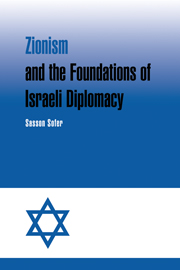Book contents
- Frontmatter
- Contents
- Preface
- Glossary
- Part I Setting the scene
- 1 Ideas and the course of history
- 2 Israeli society and politics before independence
- 3 A remarkable and terrible decade
- Part II Appearances and reality
- Part III The fallacies of Realpolitik
- Part IV Sectarian interests and a façade of generality
- Part V God's dispositions
- Part VI The boundaries of the intelligentsia
- Notes
- Index
2 - Israeli society and politics before independence
Published online by Cambridge University Press: 21 December 2009
- Frontmatter
- Contents
- Preface
- Glossary
- Part I Setting the scene
- 1 Ideas and the course of history
- 2 Israeli society and politics before independence
- 3 A remarkable and terrible decade
- Part II Appearances and reality
- Part III The fallacies of Realpolitik
- Part IV Sectarian interests and a façade of generality
- Part V God's dispositions
- Part VI The boundaries of the intelligentsia
- Notes
- Index
Summary
I adhere to the view that the major issues to be negotiated with the High Commissioner at this moment are the small things …
Berl Katznelson, Mapai Political CentreIn the twentieth century, the Jewish people was confronted with an unprecedented historical challenge – the possibility of creating a sovereign nation and laying the foundations of a new society. This was the essence of the Zionist challenge, but it was undertaken in unforeseeable circumstances: an ever-deepening conflict with the Arab population which was the majority in Palestine, the struggle against British dominion and control and, finally, a bitter fight between Right and Left for the political hegemony that would determine both the character of society and the way of achieving independence.
The Jewish society of Palestine was an immigrant society, which displayed amazing innovativeness and eagerness for social experiments, most of them forced on it by the poverty of the country and the hostility of the surroundings. Thus, in addition to erecting institutions of democratic self-rule which were completely separate from the colonial administration, the Hebrew language was revived, a Jewish proletariat was created, original cooperative and collective structures such as the moshav and kibbutz were developed, and a defence force which later developed into the most powerful army in the Middle East was forged. From this same society emerged the features that were to betray it at a later stage: chauvinism, isolationism and intolerance, a bitter blend of religion and politics, an administration that was not a model of impartiality, political divisiveness and devastating spiritual discord.
- Type
- Chapter
- Information
- Zionism and the Foundations of Israeli Diplomacy , pp. 10 - 27Publisher: Cambridge University PressPrint publication year: 1998



